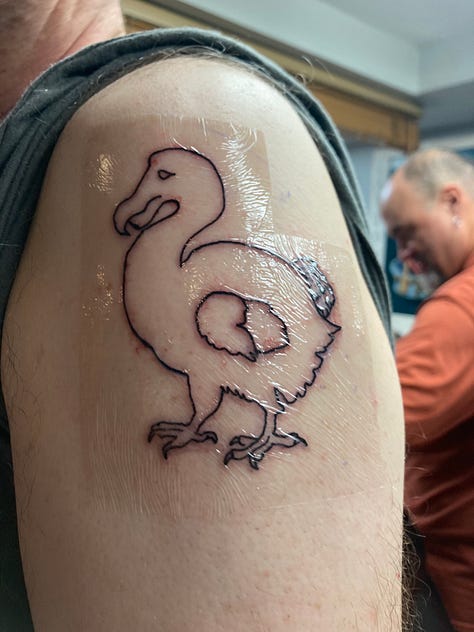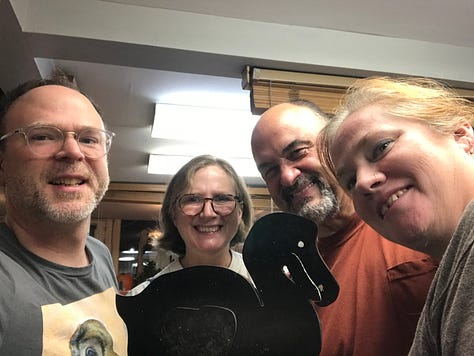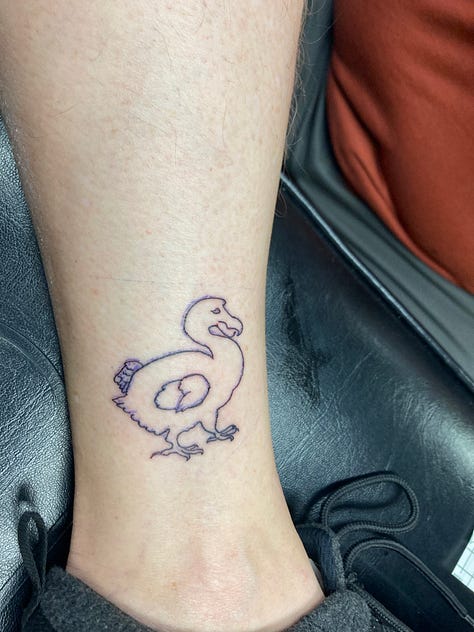
Dear Readers,
One hundred years ago, Minnie Emily Greenaway1 was living with her family in the house behind mine. Digging into her life is a band aid on the fears and heartbreak I feel about the many travesties of the world today: the anniversary of the attacks on Israel, and the escalations of war in the Middle East. 42,000 Palestinians dead — this is nearly the population of my city! Lebanon. Russian drones hunting Ukrainians. Sudan.
Seeing Hurricane Helene’s impact, especially in Asheville, where there is such great energy for fresh milling and baking, and anticipating Milton’s is like living in a horror movie. I can’t bake my way out of feeling terrified, but this doesn’t stop me from trying. Walnut bread and hermit cookies are in regular play.
And I think about Minnie. We, she and I, live on a hill, about a ten-minute walk above the heart of the city. Our piece of that hill, the land between our houses, erodes continuously, and bits of broken dishware push up, waving to me, hello, hello, calling from the past. Whatever I find, I always think it could have been hers or her family’s, even though so many other people lived in the houses on our block, then, and in the time since! I have stacks of treasures, inside and outdoors.
I’ve always been hungry for ghosts. A century ago, this one was a student at the State Teachers College in Albany and rode the trolley across the river to classes. At 25, she was older than a junior is now, because going to college took personal determination, and deep commitment from families. Even though tuition was free at this and many other state-run teachers’ colleges, students had expenses and wouldn’t be contributing to household upkeep as much as they did when working.
I try to imagine what her family and school life were like, but the texture of everyday life was so different. Multigenerational living was common2 and cars were rare. Surrounding my house were several tiny stores, including one run by the Greenaway’s landlord, an Armenian family named Bakerian. There were a very few larger grocers dotted around the city, but they were still tiny compared to today’s supermarkets and warehouse stores.
Bread was delivered door-to-door by Freihofer’s, which had opened 11 years prior, but the wagon did not stop at 148 Ninth! Mr. Bakerian could have stocked flatbreads from an Armenian bakery at his store. Minnie’s family ate bread that her father, Will, brought from the small bakery where he worked downtown. He had no interest in large scale baking — from reading her memoir, I know that he thought that mixers beat the flavor out of bread dough!

This way of life seems remote but bridging the gap between anyone alive and near me— me and my mate, me and my siblings, me and my neighbors — also feels nearly impossible. We have feelings we translate to words and the words are estimations, broad agreements that can miss the mark, or nearly hit it, or come out wildly wrong. But just because speaking and writing are clumsy tools doesn’t keep me from using them! I bake. I write. I am.
When the January 6th insurrection happened, and my dad was newly dead, I wryly thought that this would have killed him. As the pile on continues, I think he would die over and over again, slayed by human folly. Watching catastrophes, I feel him mourning alongside me.
My sister, brother and I just got dodo tattoos for him, Kevin Charles Halloran. He made plywood dodo birds and tried to sell them as replacements for eagles as emblems of America. In the early 1970s, people were beginning to be aware of the weight humans had on the environment, and he thought an extinct bird was a better motto for America than an endangered one.



What a joyous evening we had! This was my first tattoo, and it did not hurt as much as I thought. I hardly notice the creature that’s now in residence on my ankle. Silly as it sounds, I think I hoped that commemorating my father would resurrect him, somehow. I sense him more as summer slips away and fall lands on us — leaves finally turning in a blaze. The weight of our losses is heavy, individually and cumulatively. What must this feel like to the youth who are inheriting this climate chaos?
One cure I’m seeking for my sadness is connecting with people. Walking with friends. Eating together. I was loving riding my bike with Troy Social Cycling, which drew about 40 folks together Tuesday nights for group rides through the city. Now that my knee is injured — hamstring tendinitis — I can’t do that, but I still have so much, I can’t really lament.

Well, my friends, I hope you are doing all right, and I thank you for reading this. I hope you are baking or eating great baked goods, looking at something beautiful, and finding the human glue we all need.
Yours,
Amy
Minnie Emily Greenaway, 1899-1961, is a writer I’m studying. In 1924, she and her family lived at 148 Ninth Street, in a house with one of the Bakerian Brothers, who ran a grocery store at 164 Ninth Street. The neighborhood had a lot of Armenians, and the Armenian Calvary Congregational Church, which was built in 1916.
The Greenaway’s moved here to be closer to Will Greenaway’s work at a bakery downtown, and possibly to reduce the time Minnie spent commuting to college.
For a great read about communal living & non-nuclear family life, try Lola Milholland’s new book, Group Living and Other Recipes! She is a food entrepreneur, founder of Umi Organic noodles, and the book is just terrific.





I love learning more about the history and the people who make Troy what it is today. Especially the histories of families that are not famous or fabulously wealthy, whose lives were well lived surrounded by community and love. Excellent piece, Amy!
I was born as WWII had ended in Europe (July 1945).and my parent were born 1907. Mom only baked bread when there was a bakers’ strike. She and Dad occasionally exclaimed “better than sliced bread!” Pies were constant; salvaging eatable parts of gnarly fallen apples and boxes of Nonesuch compressed mincemeat were weekly dessert. Mom, however, grew up in a southwestern Pennsylvania home where pies were made Saturday and eaten breakfast, dinner, and supper every day of the week. “It is just like toast with butter and jam” she said.
[ I hope you meant to invite this additional history. Thanks Amy ].
Annee Borthwick, Troy NY 10-09-2024